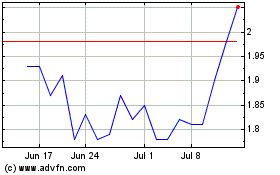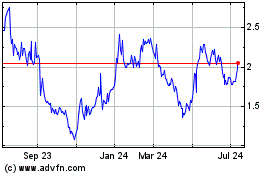Current Report Filing (8-k)
November 08 2019 - 4:03PM
Edgar (US Regulatory)
UNITED STATES
SECURITIES AND EXCHANGE COMMISSION
Washington, D.C. 20549
FORM 8-K
CURRENT REPORT
Pursuant to Section 13 or 15(d) of the
Securities Exchange Act of 1934
Date of Report (Date of earliest event reported): November 8,
2019
CORVUS PHARMACEUTICALS, INC.
(Exact name of registrant as specified in its charter)
|
Delaware
|
001-37719
|
46-4670809
|
|
(State or other jurisdiction
of incorporation)
|
(Commission
File Number)
|
(IRS Employer
Identification Number)
|
863 Mitten Road, Suite 102
Burlingame, CA 94010
(Address of principal executive offices, including Zip Code)
Registrant’s telephone number, including area code: (650)
900-4520
Check the appropriate box below if the Form 8-K filing is intended to simultaneously
satisfy the filing obligation of the registrant under any of the following provisions:
|
|
☐
|
Written communications pursuant to Rule 425 under the Securities Act (17 CFR 230.425)
|
|
|
☐
|
Soliciting material pursuant to Rule 14a-12 under the Exchange Act (17 CFR 240.14a-12)
|
|
|
☐
|
Pre-commencement communications pursuant to Rule 14d-2(b) under the Exchange Act (17 CFR 240.14d-2(b))
|
|
|
☐
|
Pre-commencement communications pursuant to Rule 13e-4(c) under the Exchange Act (17 CFR 240.13e-4(c))
|
Securities registered pursuant to Section 12(b) of the Act:
|
|
|
|
|
Title of each class
|
Trading symbol(s)
|
Name of each exchange on which registered
|
|
Common Stock, Par Value $0.0001 per share
|
CRVS
|
Nasdaq Global Market
|
Indicate by check mark whether the registrant is an emerging growth company as defined
in Rule 405 of the Securities Act of 1933 (17 CFR §230.405) or Rule 12b-2 of the Securities Exchange Act of 1934
(17 CFR §240.12b-2). Emerging growth company [ X ]
If an emerging growth company, indicate by check mark if the registrant has elected not
to use the extended transition period for complying with any new or revised financial accounting standards provided pursuant to
Section 13(a) of the Exchange Act. [ X ]
On November 8, 2019, Corvus Pharmaceuticals, Inc. (“Corvus” or the “Company”)
announced updated results from the first two arms of its Phase 1/1b trial evaluating CPI-006 as a single agent and in combination
with ciforadenant. The updated data includes data from 24 patients who received CPI-006 given intravenously as monotherapy (at
doses of 1, 3, 6, 12, 18 or 24 mg/kg every 21 days) and 16 patients who received the combination treatment of CPI-006 (1, 3, 6,
12 or 18 mg/kg every 21 days) plus a fixed dose of ciforadenant (100 mg twice daily). These patients had advanced, refractory disease
(12 had colorectal cancer, six had renal cell cancer, six had pancreatic cancer, six had prostate cancer, five had head and neck
cancer, three had non-small cell lung cancer, one had bladder cancer and one had sarcoma), and had failed a median of four prior
therapies. The key highlights from the updated CPI-006 clinical results include:
|
|
•
|
Pharmacokinetic
studies showed a dose-dependent increase in CPI-006 plasma exposure, with doses of 6 mg/kg and higher producing sustained plasma
levels of CPI-006 and doses of 12 mg/kg and higher achieving complete and sustained occupancy of CD73 on peripheral blood lymphocytes.
|
|
|
•
|
Biopsies
revealed penetration of CPI-006 and complete occupancy of CD73 in tumors at doses of 18 mg/kg, which is the selected dose for
continued expansion of the study.
|
|
|
•
|
In vitro results revealed that CPI-006 induced B-cell differentiation into both plasmablasts and memory B-cells, promoted secretion
of immunoglobulin M (IgM), and class switching of the IgM to produce immunoglobulin G (IgG).
|
|
|
•
|
In vivo results demonstrated that treatment with CPI-006 produced changes in blood B-cell and T-cell levels, highlighted by
a reduction in circulating B-cells within 30 minutes of treatment, with a partial return by 21 days, and with returning B-cell
levels heavily enriched with memory B-cells. These changes are consistent with the in vitro findings that suggest that CPI-006
induces a humoral adaptive immune response.
|
|
|
•
|
A specific analysis of the B-cell receptor repertoire (the range of B-cell receptors expressed by the total B-cell population)
revealed that several patients exhibited the induction of new memory B-cell clones in blood following treatment with CPI-006, with
clonal frequencies as high as 1%, supporting a very strong antibody immune response comparable or exceeding that seen when patients
receive vaccinations. These findings are consistent with antigen driven clonal expansion of B-cells.
|
|
|
•
|
In evaluable patients receiving 6 mg/kg and higher in the protocol defined, pre-specified disease specific cohorts, tumor regression
was seen in four of nine patients: mCRPC (one of two patients; reduction of 18.2%), RCC (two of five patients; reduction of 7.0%,
21.3%) and NSCLC (one of two patients; reduction of 5.8%).
|
|
|
•
|
A
patient with metastatic prostate cancer that had previously failed multiple anti-androgen therapies and chemotherapy received
over 19 cycles (a cycle equals 21 days) of CPI-006 monotherapy at a dose of 6 mg/kg and showed reduction in tumor volume and a
reduction in bone pain.
|
|
|
•
|
CPI-006
was well tolerated at all dose levels, with no dose-limiting toxicities. Grade 1 infusion reactions were detected (N=3 patients)
and mitigated with premedication with acetaminophen and antihistamine. Grade 3 or 4 toxicities included a grade 3 anemia (N=1)
and a grade 3/4 diarrhea (N=1).
|
The Company also announced updated data on the Adenosine Gene Signature. The key highlights
from the updated data include:
|
|
•
|
The Adenosine Gene Signature was examined in 32 patients with advanced refractory renal cell cancer, including 21 that were
positive for this biomarker and 11 that were negative for this biomarker. In patients with a positive biomarker result, 17% had
a partial response (PR) and many had tumor regression that did not meet the response evaluation criteria in solid tumors (RECIST)
for PR. In patients with a negative biomarker result, there were no responses. In the 21 patients in the Adenosine Gene Signature
positive group, 9 patients had tumor regression; 4 patients had no change in tumor size and 8 patients had tumor progression as
best response; no patients in the negative group showed tumor reduction. There was a statistically significant correlation of the
Adenosine Gene Signature with tumor response, p=0.008.
|
|
|
•
|
A positive Adenosine Gene Signature was also associated with duration of response. Six of 21 patients had progression free
survival (PFS) exceeding 40 weeks, with a plateau on the curve, and all of these patients were Adenosine Gene Signature positive,
including four patients who had failed prior therapies with anti PD(L)-1.
|
|
|
•
|
CPI-006 blocks CD73 enzymatic activity and prevents conversion of adenosine monophosphate (AMP) to adenosine leading to an
elevation of AMP levels.
|
|
|
•
|
AMP induces gene expression changes nearly identical to the Adenosine Gene Signature due to its ability to bind to and activate
the adenosine A2A receptor, producing similar effects to that of adenosine binding to the A2A receptor.
|
|
|
•
|
CD73 antagonists preserve AMP and thereby amplify the AMP gene expression signature.
|
|
|
•
|
Ciforadenant (which has been shown to inhibit adenosine binding to A2A receptor) blocks both AMP and adenosine induced gene
expression changes.
|
|
|
•
|
This suggests that use of CPI-006 (which has been shown to inhibit adenosine production) in combination with ciforadenant could
be a more effective way to block the immunosuppressive effects of A2A receptor signaling.
|
|
Item 7.01
|
Regulation FD Disclosure.
|
On November 8, 2019, the updated results from the CPI-006 trial discussed
above were presented in an oral session at the Society for Immunotherapy of Cancer (SITC) Annual Meeting in National Harbor, Maryland
by Jason J. Luke, M.D., principal investigator of the trial and Director of the Cancer Immunotherapeutics Center at UPMC Hillman
Cancer Center and Associate Professor of Medicine at the University of Pittsburgh School of Medicine. A copy of the presentation
is furnished as Exhibit 99.1 to this Current Report and is incorporated herein by reference.
On November 8, 2019, the updated data on the Adenosine Gene Signature
discussed above were presented in a poster session by Stephen Willingham, Ph.D., Corvus Senior Scientist. A copy of the poster
is furnished as Exhibit 99.2 to this Current Report and is incorporated herein by reference.
The information in this Item 7.01 of this Current Report on Form
8-K (including Exhibits 99.1 and 99.2) shall not be deemed “filed” for purposes of Section 18 of the Securities Act
of 1934, as amended (the “Exchange Act”), or otherwise subject to the liabilities of that Section, or incorporated
by reference in any filing under the Securities Act of 1933, as amended, or the Exchange Act, except as shall be expressly set
forth by specific reference in such filing.
Forward-Looking Statements
To the extent that statements contained herein or in the presentations
attached hereto as Exhibits 99.1 and 99.2 are not descriptions of historical facts regarding Corvus, they are forward-looking statements
reflecting the current beliefs and expectations of management made pursuant to the safe harbor provisions of the Private Securities
Litigation Reform Act of 1995, including statements related to the potential safety and efficacy of CPI-006 and ciforadenant (CPI-444),
the Company’s ability to develop and advance product candidates into and successfully complete preclinical studies and clinical
trials, including the Company’s Phase 1/1b clinical trial of CPI-006, the utility of biomarker data collected and the suitability
of dosing regimen selected for clinical trials and the potential utility of the Adenosine Gene Signature to identify patients that
are most likely to respond to therapies targeting the adenosine pathway. Such forward-looking statements involve substantial risks
and uncertainties that could cause the Company’s clinical development programs, future results, performance, or achievements
to differ significantly from those expressed or implied by the forward-looking statements. For a description of the risks and uncertainties
that could cause actual results to differ from those expressed in these forward-looking statements, as well as risks relating to
the business of the Company in general, see Corvus’ reports filed with the Securities and Exchange Commission (“SEC”),
including its Quarterly Report on Form 10-Q for the quarter ended September 30, 2019, filed with the SEC on October 29, 2019, as
well as other documents that may be filed by the Company from time to time with the SEC.
|
|
Item 9.01
|
Financial Statements and Exhibits.
|
SIGNATURES
Pursuant to the requirements of the Securities Exchange Act of 1934,
as amended, the registrant has duly caused this report to be signed on its behalf by the undersigned hereunto duly authorized.
|
|
CORVUS PHARMACEUTICALS, INC.
|
|
Date: November 8, 2019
|
By: /s/ Leiv Lea
Leiv Lea
Chief Financial Officer
|
|
|
|
Corvus Pharmaceuticals (NASDAQ:CRVS)
Historical Stock Chart
From Mar 2024 to Apr 2024

Corvus Pharmaceuticals (NASDAQ:CRVS)
Historical Stock Chart
From Apr 2023 to Apr 2024
